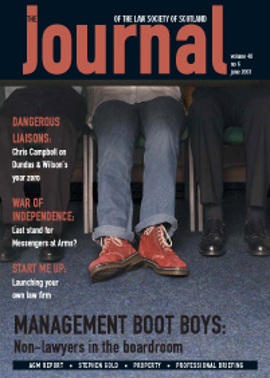Hardening up the soft side
There was a time when one could say that never (well almost never) would one hear this kind of thing from a solicitor. When I qualified in 1975, professional discourse was a serene oasis of refinement. To be seriously rude, you had to take the scenic route. Referring to 27 reminders, sent over the previous six months, you expressed your “concern” or, if you were really dishing it out, “serious concern.” “With respect”, signalled none whatsoever and “with great respect” black contempt.
The tone reflected the times. Fees were on a scale. Tender did not mean procurement, but how you felt towards a lover, or after a kick on the ankle. Clients knew their place. Lunch was at one.
Today, that world is unrecognisable. Not everyone may agree with me, but I believe it is much better for it. The physical and intellectual demands on us are far greater, but equally clients are better served and people who accept the challenge have real opportunities to succeed.
One unwanted consequence is greater abrasiveness. I do not mean the combative streak we all need to protect our clients’ interests. I mean the routine grumpiness and gracelessness, often over small matters, which typify our dealings with one another far more than they used to.
You don’t have to be Freud to realise that this behaviour is nothing to do with solicitors in the past being intrinsically more good-natured. It is the consequence of a relentlessly demanding and for too many, poorly rewarded environment.
As a profession, what are we doing to help people afford the personal cost of all this? As far as I can see, next to nothing. We spend fortunes training people to make the most of their academic and practical skills, but very little on helping them develop their emotional armoury. To the extent that emotional intelligence is thought about, it is regarded as a “soft” issue. In fact, it is anything but soft. It profoundly influences our effectiveness, the quality of our relationships with clients and the service we provide them. As importantly, it has no less an effect on our lives outside the office.
How can we do better? I would start where minds are freshest, in the universities. It would be radical, but surely not difficult, for law schools to work with colleagues in other specialisms, teaching the personal skills needed to equip students for the demands of professional life, not to mention life in general. For best effect, I would teach them as part of the Diploma, just when “real life” begins to click in.
Going forward, I would make this area a distinct part of our CPD. Currently, it is compulsory to devote part of our annual requirement to “management”, whether we manage or not, but not to management of ourselves. The third element - and perhaps the most difficult – is working to create a culture in our firms where human fallibility is expected, forgiven and properly managed, long hours are not regarded as an end in themselves and the ability to make effective relationships given parity with the more traditional skills.
Of course, there’s always the pub, the traditional venue for “stress management”, but better I believe to call time on an approach which for too long has been all about pouring in the facts and almost nothing about the strength or capacity of the container.
In this issue
- Hardening up the soft side
- Diversity of disciplines shape new business of law
- Credibility at stake in crisis of confidence
- Escape from Andersen
- Let mediation take the strain
- Taming two imposters: triumph and disaster
- A brief history of time management
- Executry practitioners run daily risks
- Risk management
- New industry standard for online legal data
- Chhokar inquiry had cathartic effect on prosecutor






